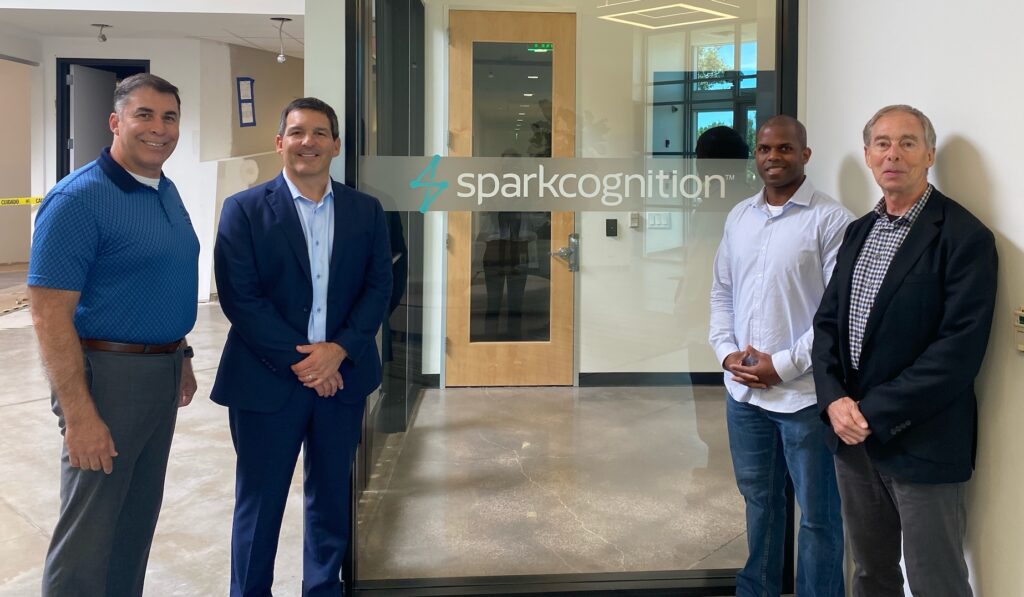Talking AI in Defense with Rep. John Carter and Staff
SparkCognition Government Systems | July 7, 2022
By Campbell LeFlore

Last month, SparkCognition Government Systems (SGS) was honored to meet with key staff members from the office of Representative John Carter (31st Congressional District of Texas), giving them a tour of SGS’ Austin headquarters and demonstrating our present and forthcoming AI-powered solutions to enhance mission readiness and battlespace management.
Kahlil Warner, defense fellow in Rep. Carter’s office, and August Alvarado, deputy chief of staff for Rep. Carter, met with SGS team members, including Logan Jones, president and general manager, Rome Ruiz, vice president in charge of defense programs and customer operations, John Canipe, director of business development, Lane Boyer, solutions designer, and Dr. Bruce Porter, chief science officer for SparkCognition.
On the agenda: highlighting areas of opportunity between SGS and government leadership to accelerate AI adoption in support of our national defense. SGS shared details of maintenance solutions it has delivered to the Air Force to address asset availability challenges and improve fleet readiness. We also previewed projects underway to operationalize multi-domain awareness and enhance human decision-making in the battlespace.
An ongoing conversation from TX-31 to Washington, D.C.
The meeting at SGS headquarters continued a constructive dialog going back to last September, when Rep. Carter, his staff, and city officials from Florence, Texas, toured HyperWerx: our first-of-its-kind aerial-terrestrial autonomy integration facility in Williamson County. At the time, Rep. Carter reflected: “Seeing firsthand the AI technology in action is something that helps me as we discuss issues in Congress. The role of AI technology in all sectors of government continues to be a conversation on Capitol Hill, and no doubt, joining SparkCognition to learn more about their AI advancements helps give additional perspective as we debate legislation.”
After the recent meeting at SGS headquarters, Warner spoke of continuing interest in Washington, D.C., circles to explore ways to leverage successful commercial implementations of artificial intelligence for the military today and tomorrow. “I’m excited at the government’s willingness to pursue AI innovations within maintenance analytical tools that improve readiness and efficiencies while saving taxpayer dollars from wasteful practices caused by continuity gaps,” he said.
Later on social media, he wrote, “Incredible work the team in Austin does to optimize and increase efficiencies for a wide range of DoD dedicated systems. Can’t wait to see the next phase of innovations from this energetic team!!!”
Our Q&A with Rep. John Carter
As a follow-up to our June meeting, Rep. Carter spoke with us about current and future efforts to integrate AI solutions for government and military.
Based on conversations happening on Capitol Hill, what general trends are you and your colleagues seeing with AI in the government?Carter: AI is being looked at more on Capitol Hill as possible solutions for the country’s biggest problems. From border security to health care to defense, AI can offer capabilities that maximize efficiency and effectiveness.
Do you think AI adoption is a challenge in government? What role do you see technology companies like SGS playing in addressing these challenges?Carter: Adoption of anything in government is slow-moving. It’s important to continually keep lawmakers informed about the potential capabilities of AI technology. Lawmakers want to ensure that we are utilizing the best technology while saving taxpayer dollars and effectively meeting the needs of the country.
Do you think it’s important to have companies like SGS in your district? Why?
Carter: Absolutely, the talent and innovation present in TX-31 at companies like SGS help keep our workforce strong and they positively impact the communities that surround them.
How are you and your office helping to advance technology advocacy and adoption?Carter: As a member of the Appropriations Committee, I’m always learning about new ways to meet our most pressing defense challenges. Back when Army Futures Command was choosing a location, I fought hard to have it in Central Texas because innovation from Central Texas companies can change the way we fight wars to make our servicemembers safer and more effective. Continually meeting with technology companies to learn about cutting-edge innovations is an important part of my job, and I thank SGS for always welcoming me and my team to learn more about their work.
—
We sincerely thank Rep. Carter and his amazing staff for their positive impact in TX-31, for making time to understand how SGS’ solutions for mission-readiness and battlespace management can address critical national security initiatives, and for their unwavering commitment to driving AI adoption forward—a commitment we hold in common.